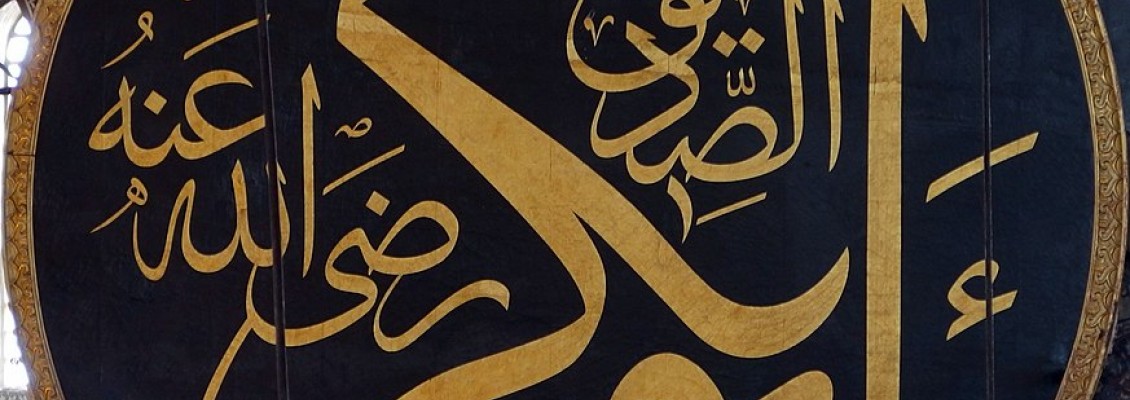
ABU BAKR (RA)
Paintings and sculptures are not permitted in mosques due to Islam’s emphasis on the nonphysical understanding of God. Instead, calligraphy is widely used as a means of artistic and spiritual expression. Alongside the name of Allah, other significant names are often featured in mosque calligraphy. One such name is Abu Bakr (ra, May Allah Be Pleased with Him), the first caliph of Islam.
Abu Bakr (ra) was one of the closest companions of Prophet Muhammad (pbuh) even before the Prophet received revelation. He was also among the first to believe in and embrace Islam when the Prophet (pbuh) began his mission. The Prophet (pbuh) famously said that when others rejected him, Abu Bakr (ra) believed wholeheartedly and sacrificed everything for the sake of Islam. Abu Bakr (ra) was known for his gentle demeanor and noble character. He was humble, sensitive, approachable, and deeply compassionate. Despite his wealth, he lived a life of simplicity, often wearing old clothes and generously spending his wealth in the cause of Allah. His loyalty to the Prophet (pbuh) was unmatched, and he accepted the Prophet’s message and teachings without hesitation. One of Abu Bakr’s (ra) remarkable qualities was his deep understanding of the Qur’an and the actions of the Prophet (pbuh). He memorized the Qur’an, recited it beautifully, and was an eloquent speaker. His ability to grasp and implement the teachings of Islam with clarity and swiftness made him a respected leader and a source of guidance for the early Muslim community.
Abu Bakr (ra) is one of the leading figures of the Quraysh tribe, one of the most influential tribes in the Arabian Peninsula. Because of his tribe, he greatly contributed to the spread of Islam. Through him, many individuals, including some of the prominent people of Quraysh, became Muslims. In addition, he bought many slaves, who were subjected to severe torture by their masters for being Muslim, by paying large sums of money and freed them. He stated that his purpose in doing this was only for the sake of Allah.
Abu Bakr (ra) stood by Prophet Muhammad (pbuh) during his mission to invite people to Islam, assisting him in forming connections and building friendships with various tribes. In the fifth year of the Prophet Muhmmad’s (phbh) prophethood, he left Mecca to go to Abyssinia as a result of the Quraysh’s increasing pressure and torture on the Muslims and their refusal to allow him to read the Qur’an aloud. On his way to Abyssinia, the Quraysh intercepted him and offered him a compromise: he could remain in Mecca as long as he practiced his faith in secrecy. Initially agreeing, Abu Bakr (ra) soon found it unbearable to worship quietly or recite the Qur’an silently. He broke the agreement with the Quraysh, choosing to openly practice his faith. Despite the risks, he remained in Mecca, declaring that he sought protection only from Allah. As the Quraysh’s oppression intensified, Muslims were forced to leave Mecca, with Medina chosen as their new sanctuary. Abu Bakr (ra) approached the Prophet (pbuh) for permission to migrate, but the Prophet (pbuh) advised him to wait, saying, “Allah will grant you a companion.” Realizing that he would have the honor of accompanying the Prophet (pbuh) on this journey, Abu Bakr (ra) eagerly began preparing for migration.
After the migration, Abu Bakr (ra) purchased the land that the Messenger of Allah (phbh) deemed suitable for the construction of a mosque and started his activities in Madinah. Just as in Mecca, Abu Bakr (ra) remained close to the Prophet (pbuh) in Medina, rarely leaving his side. The Prophet (pbuh) frequently sought Abu Bakr’s (ra) counsel on important matters and once remarked that he knew no one more beneficial to Islam than Abu Bakr (ra). He also said, “If I were to take a close friend (khalil) among people, it would be Abu Bakr.”
During the Prophet’s (pbuh) final illness, he appointed Abu Bakr (ra) to lead the prayers in his place, signifying Abu Bakr’s (ra) standing in the community. On one occasion, while Abu Bakr (ra) was leading the prayer, the Prophet (pbuh) joined the congregation and stood beside him. Seeing the Prophet (pbuh) had recovered enough to come to the mosque brought great joy to Abu Bakr (ra) and the Companions. Later that day, Abu Bakr (ra) sought permission to visit his own home, which he had not done for some time. A few hours later, news reached him of the Prophet’s (pbuh) passing. Deeply affected, Abu Bakr (ra) immediately returned to where the Prophet (pbuh) was staying. He uncovered the Prophet’s (pbuh) face, kissed his forehead, and then went to the mosque to address the grieving community.
To reassure those who struggled to accept the reality of the Prophet’s (pbuh) death, Abu Bakr (ra) said;
“Whoever worships Muhammad (phbh), let him know that Muhammad (phbh) is dead. Whoever worships and serves Allah (swt) should know that Allah (swt) is Hayy, immortal”
He then recited the verse from the Qur’an:
“Muḥammad is no more than a messenger; other messengers have gone before him. If he were to die or to be killed, would you regress into disbelief? Those who do so will not harm Allah whatsoever. And Allah will reward those who are grateful.” (Qur’an, 3:144)
This moment marked the beginning of Abu Bakr’s (ra) leadership as the first caliph of Islam, guiding the community with wisdom and steadfastness during a time of profound loss.

Leave a Comment